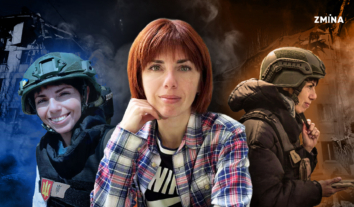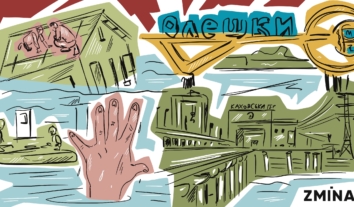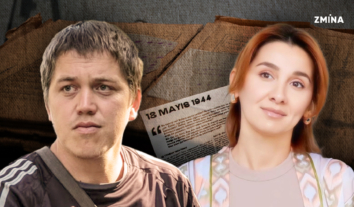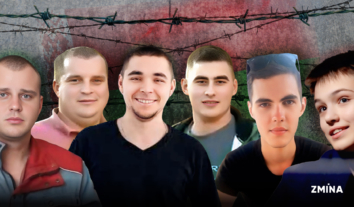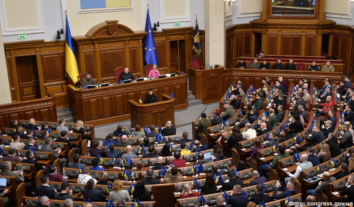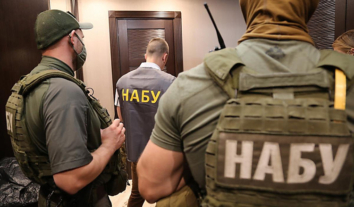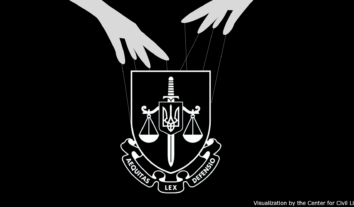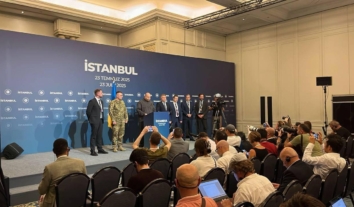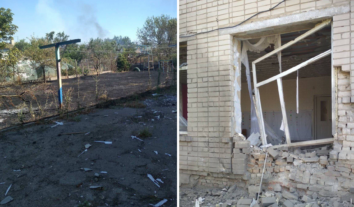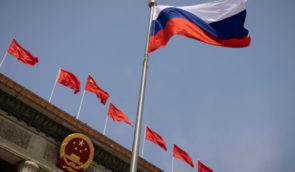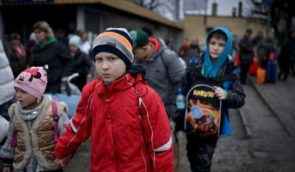‘Spring was very cold. Or so it seems to us’: Story of man from Mariupol who survived under rubble of bombed-out building but lost his daughter
Yevhen Kostomanov, 59, lived and worked in Mariupol all his life. In March, the man lost his daughter – she was killed as a Russian aerial bomb hit their house – but he managed to survive. Yevhen told ZMINA about the month spent in Mariupol and how he, his wife, and seven-year-old grandson fled the city literally on foot.
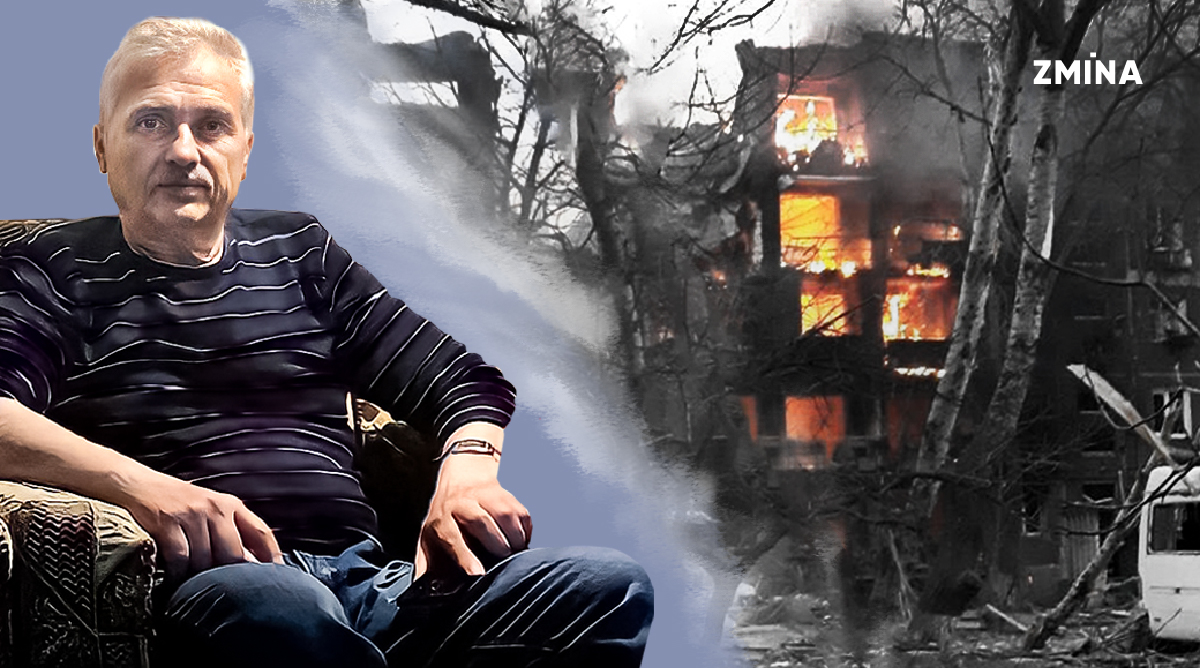
At home
Yevhen Kostomanov, a native of Mariupol, is due to retire this year. He is one of those Mariupol residents who contributed to the development of the city actively since 2015. The husband’s last place of employment was the public utility company of the Mariupol City Council “Pryazovsky Investment Company” where he worked as a director and project manager. The man, in particular, took care of the construction of the AzovAkvaInvest industrial park – 12 production enterprises were to start working in its territory.
Yevhen, his 30-year-old daughter Anastasia, his wife Tetiana, and seven-year-old grandson Sashko, lived in Tsentralnyi district on the outskirts of the western part of Mariupol.
“On February 24, I woke up early, as usual, at half past six, and heard explosions near the airport. It is not far from us, the military personnel were stationed there in recent years, so I thought that the airport was being shot at,” Yevhen recalls.
At the same time, neither the man nor his family were frightened:
“In 2014, the eastern part of the city was struck with Grad MLRS. It is far from us. So, based on the information we heard from the president and the leadership of Mariupol that everything was fine and nothing would happen, we thought that thugs and marginals would run around the city for three days, like in 2014, and everything would end.”
Like many city residents, the man did not believe to the last that Mariupol would be destroyed completely. According to Yevhen, the first two evacuation trains departed from the city 30% full in February.
The Kostomanov family lived in an apartment on the second floor of a five-story building, surrounded by nine-story buildings.
“When Grad launchers started firing, we were calm and even thought that if a rocket arrived, it would hit a nine-story building nearby, not our house. So it was for some time. Our house was not hit for the first couple of weeks, but neighboring houses were constantly shelled. Especially those that faced Kuprin Street. They were constantly struck, louder and stronger with each passing day.”
About 250 people from these houses lived in a large basement of the Zhyhuli auto store located on the first floor of one of the nine-story apartment blocks, Yevhen says.
However, soon after, a rocket hit a neighboring five-story apartment block – then, for the first time, two windows on the balcony of the Kostomanovs’ apartment were blown out.
“We understood that we had to go, but it was not clear where. And in the end, we didn’t really want to leave the apartment, in which everything was earned by hard work, I’m not exaggerating,” Yevhen explains.
According to him, some of the neighbors said that they had tried to leave the city at the beginning of March but they were allegedly stopped at a Ukrainian checkpoint and made return.
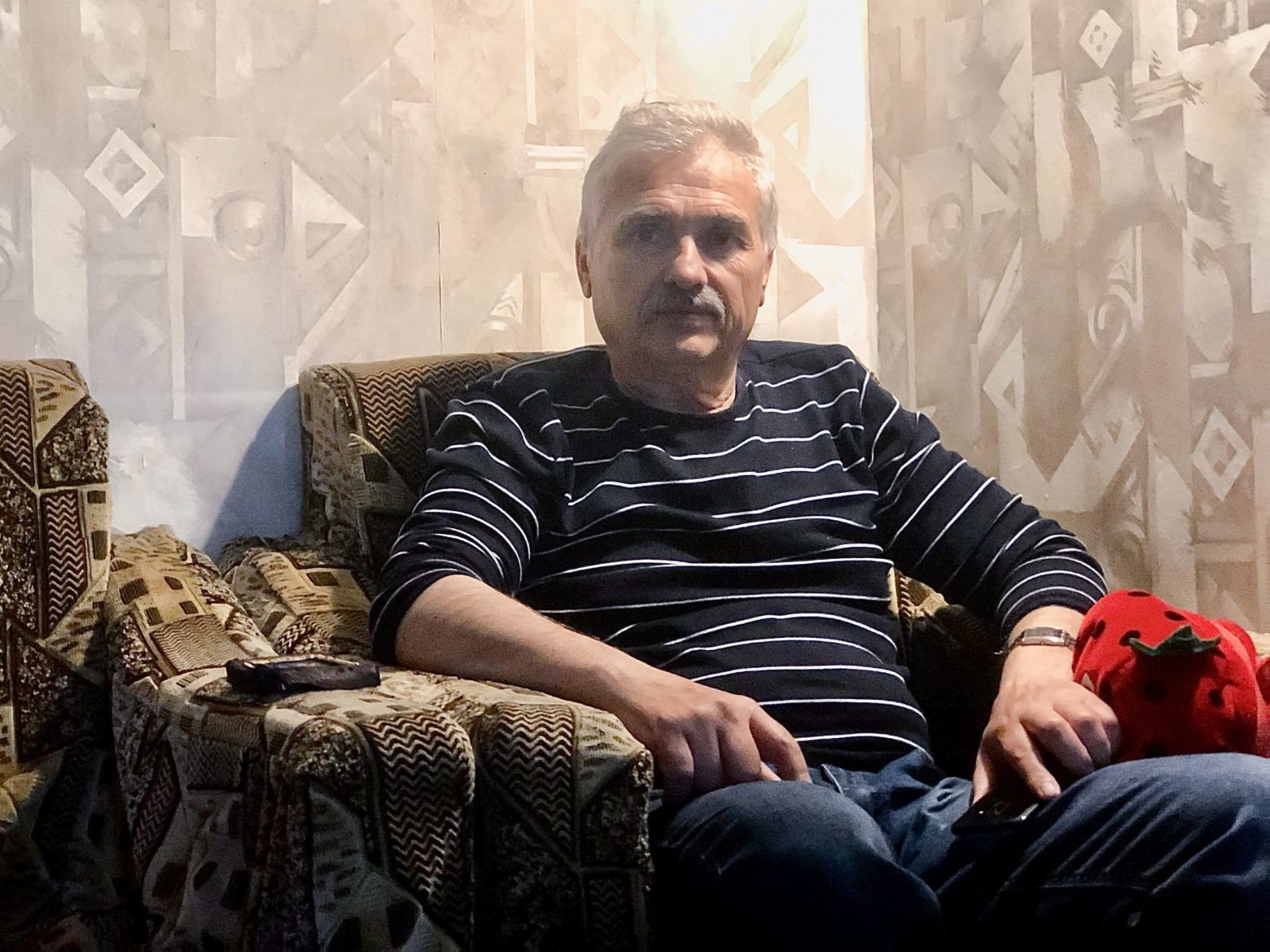 Yevhen Kostomanov
Yevhen KostomanovRussian lies
The other day, Yevhen and his daughter walked around the city to see the situation and understand where it is possible to leave. They headed towards Primorsky district, where an acquaintance lived who raised chickens and quails for sale. The Kostomanovs bought chicken and eggs from her, although the family had a certain stock of food and drinking water.
On March 3, Yevhen and his daughter saw the corpses for the first time in the city – two elderly people were killed with a Grad shell in front of them. The people returned from the springs with collected bottles of drinking water.
On the same day, Mariupol was blacked out, and the water supply was cut off. Shelling intensified.
“The windows in our apartment started to crack. We closed the windows with film, but it quickly got cold, the temperature dropped to 8 degrees below zero at night. However, we still did not want to leave, we did not believe that the city would be wiped off the face of the earth. That’s why we stayed in the apartment until March 9.”
In the end, when it became “absolutely scary and cold,” Yevhen says, the family went down to the basement of their house. About 20 of their neighbors already lived there.
The Kostomanovs took a mattress from a double bed with them to the basement, packed documents, money, and Yevhen’s work laptop in an alarming suitcase. The shelter was divided into “rooms”: in the corner of the one they arranged for themselves, the family set up a wooden stool and placed an icon on it.
Yevhen and his daughter also found a CD player with a radio in the old children’s things.
“Just imagine, the batteries left in it since the early 2000s still functioned!” the man astonishes.
In the evenings, lying side by side in the shelter, father and daughter listened to the radio. Yevhen had one earpiece, Anastasia had the other.
The Ukrainian radio signal had already been jammed, almost nothing could be understood. Instead, Russian news reports made their way.
On March 11, Yevhen recalls, the Russians talked in a “theatrical manner” about the bombing of city hospital No. 3, including the maternity hospital.
“This is a fake, they [Russians] say that a bomb was dropped from an aircraft but it wasn’t ours and there were no women in labor and doctors at all, Azov fighters are sitting there,” the man parodies the message of Russian radio presenters.
Yevhen is indignant,”They said all that in half-joking intonations. We listened to it and thought: ‘How can you lie, we are eyewitnesses’”.
That day, he and his daughter saw with their own eyes a funnel and the aftermath of the bombing of the hospital. And aircraft, he says, flew over the city all the time:
“Mariupol was shot like in a shooting range, there were no air defense systems in the city. They hit exactly the center of the hospital territory, and the blast wave damaged all the surrounding buildings, everything was covered with earth. The hospital is located half an hour’s walk from us, we passed by it before – there were not only women in labor there but also patients and doctors, only the operating room had been moved to the basement.”
The man with his daughter also saw hundreds of city residents hiding in the shelter of the drama theater. The area nearby was always crowded – the residents of Mariupol were cooking food, and a water utility company vehicle delivered spring water.
Pillow
On March 13, Yevhen and his daughter again went to an acquaintance “to buy chickens and eggs.”
They were returning past the Donetsk Regional Court of Appeals where Anastasia worked. The girl wanted to go to her office and take some of her personal belongings.
It turned out that court employees and their families lived here in the basement – the building of the institution, built under the USSR as a military commissar, had a bomb shelter. The Kostomanovs were invited to “move” here. They said that it was “calmer” there.
“We decided to move to the courthouse the next day. We came ‘home’ very tired as we walked about 15 km there and back. And we didn’t just walk along the path, we were running constantly from one street to another when we heard a rocket flying,” Yevhen says.
He continues:
I suggested going to bed in the basement from 19:00. Although the candles were burning, it was still dark and there was nothing to do. I said: ‘Let’s go to bed, let’s go to bed.’ But we didn’t go to bed, we chatted with the neighbors. Around 21:00, the daughter said that before going to bed, she needed to go up to the apartment – go to the toilet, take nose drops for son because he had a runny nose.
Yevhen and his daughter went home for a short time. However, when they were about to leave, a bomb fell near the house:
“There was a strong explosion. In the children’s room and the bedroom, the windows of which faced the place of the explosion, the furniture was smashed – oak furniture made to order 20 years ago. But we managed to jump out and were not injured.”
Yevhen and his daughter thought that the aircraft was heading towards Azovstal steelworks. Judging by their experience, the same place had never been bombed several times in a row.
The father and the daughter went to the landing, where they met neighbor Danylo who was trying to open the door of his apartment. His grandmother and disabled father stayed there, they did not go down to the basement.
The young man wanted to take them away, but he could not open the lock as the explosion dislodged the door and jammed it, Yevhen says:
“We couldn’t open the door, so I suggested going downstairs. I had a small flashlight with me, so I took a few steps down, illuminating the stairs. And they – Danylo and my daughter – were behind.”
At that moment, a Russian aircraft dropped a bomb on their house.
Yevhen fainted. When he regained consciousness, he realized that he was pressed with the landing which broke in half. It was dark all around, dust was rising and thick smoke was pouring out.
The man’s hand was pressed against the pocket of his jacket, in which there was a phone with a remaining battery charge. Yevhen took out his mobile phone, began to shine around, and shout:
“Anastasia, Anastasia, Anastasia, Anastasia.”
But it was quiet, no one answered.
“I thought that was the end and I was going to suffocate in a few minutes. The entrance door was blocked with a concrete slab. I saw a piece of rebar in front of me, it seemed to me that I could bend it and break something off the slab. There was a crack about 10 cm wide in one of the corners under it, and a void behind it. I made the last effort and tore off the rebar and then used it to knock several pieces of concrete off the slab – I made a hole for myself and climbed out through the basement of another entrance,” Yevhen remembers that evening in detail.
The man was bleeding, he says that he did not feel pain but he could barely walk:
“My wife was running around in the street, looking for us, because she heard me shouting: ‘Anastasia.’ She and the grandson were in the basement but further from the place of the bomb explosion which saved them.”
About ten people, who were in the shelter in the radius of the blast wave, were killed.
“We were received by volunteers from the basement under the Zhyhuli store. There was a guy who treated the wounds on my head and bandaged them. My back couldn’t hold, but the volunteers brought a corset from somewhere and put it on me,” Yevhen adds that he feels great gratitude to the volunteers.
That night, he was rushing to get out of the shelter, he wanted to get to his apartment. His wife helped him.
But a fire several tens of meters high rose above the five-story apartment block – the building was burning for another day.
“I understood that it was impossible to get there and survive there either,” the man takes out his phone and turns on the video:
“This is my apartment on fire.”

The apartment of the Kostomanov family was located on the 2nd floor.
In the following days, Yevhen still managed to get to the place in the basement where his family was hiding:
“I saw some springs of our mattress. I sifted the ashes through my hands – those were our things. But the stool and the icon were intact. How was that possible? The icon was from the Sviatohirsk monastery, now it is the Sviatohirsk Lavra. Back in the 1990s, when it was being built, I donated construction materials to monks, and they gave us such icons,” the man shows the icon damaged on one side only.
Among the family treasures that survived, there are also two commendation certificates to Anastasia Kostomanova, a leading specialist in the Judicial Statistics Department of the Donetsk Regional Court of Appeals:
“For a significant contribution to strengthening the authority of the judiciary, high professionalism, personal contribution to the development of the judiciary, and on the occasion of Ukraine’s Independence Day.”
A pillow survived also. This is what a man calls a soft shoulder bag in the shape of a smiling strawberry with hands and legs. Yevhen and his wife found it in the yard of the house – the shoulder bag got there by a blast wave.
Yevhen brought it as a gift to his daughter from Prague more than 20 years ago.
“She slept on it. We took a pillow with us. It burnt a little here,” the man runs his fingers over several burns and falls silent for a while, “now Sashko sleeps on it.”
Anastasia should have celebrated her 31st birthday on April 24.
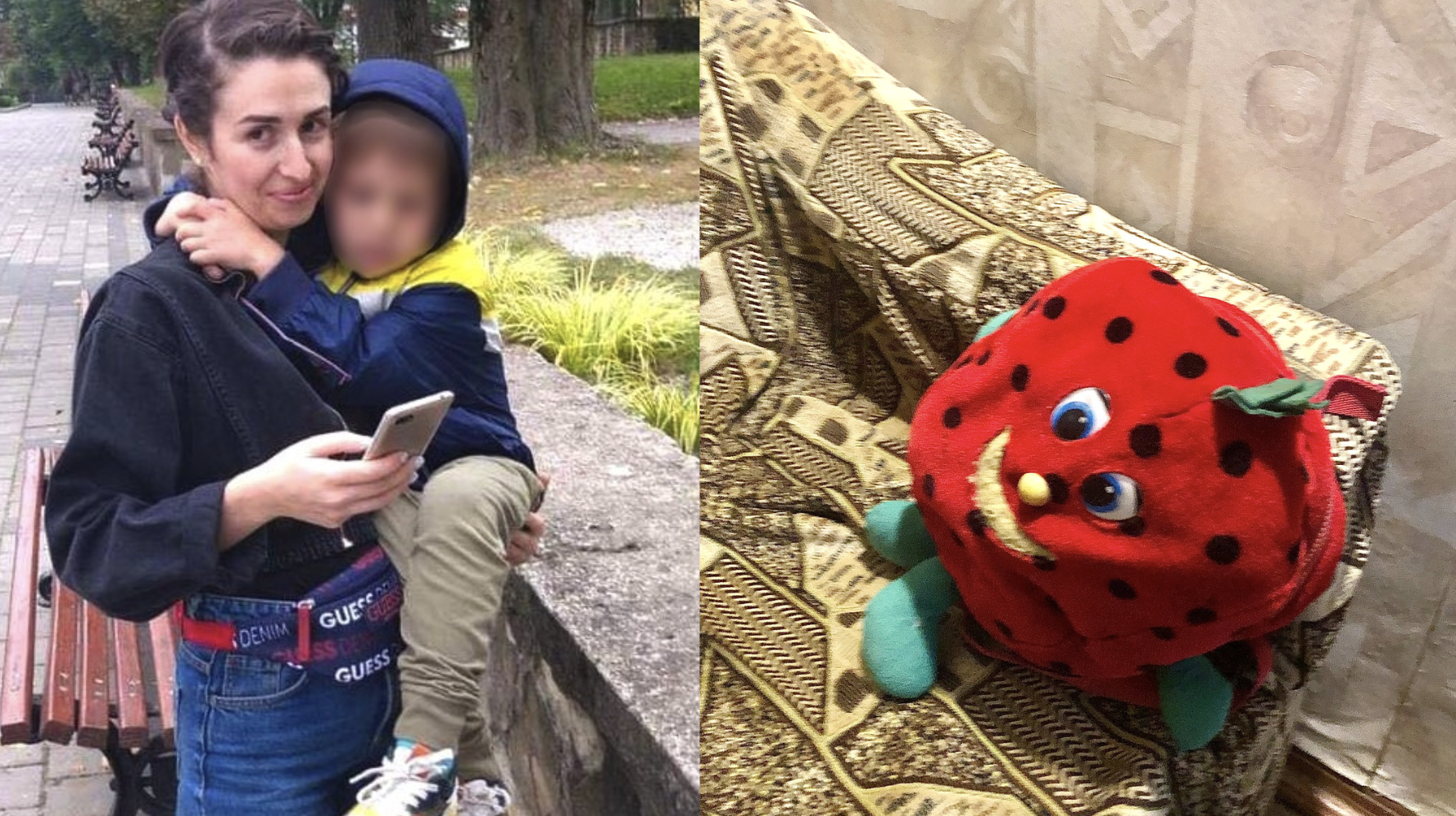 Anastasia Kostomanova and her son Sashko
Anastasia Kostomanova and her son SashkoBomb shelter
Yevhen, his wife, and grandson spent several days in the new shelter. The man understood that they could not stay here any longer:
“The soldiers were stationed in the neighboring yard. We hardly crossed paths with them but their commander came to them by car. I stood on the road while he was driving. It was impossible to get around me. He stopped, and I pointed to my apartment: ‘My daughter is there, and I have to save my grandson.’ I said that I wanted him to take us to the courthouse. He agreed. We wouldn’t have gotten there by ourselves. We were lying on the floor of the car because a sniper was working in that area. The commander drove very fast even though the roads were littered with windows, power lines, and debris from buildings. It was scary to run into something. But staying was like death.”
The Kostomanovs spent the days from March 15 to 21 in a bomb shelter under the courthouse.
“But the war again was getting closer to us. The Russians struck in squares, destroying everything. There was a hotel nearby – they bombed it, a printing house – they bombed it,” Yevhen says.
In the afternoon of March 21, he says, there was a loud explosion that shattered the entire courthouse, even the bomb shelter.
Yevhen thought a bomb had been dropped on it, so he urged another man to go out and inspect the building. After all, if their fears came true, the people inside could suffocate because the ventilation did not work.
However, a bomb hit nearby – there was a huge hole 30m of the gate. Everything was covered with pieces of earth. A solar battery, from which we charged the accumulators, turned into a sieve. My ‘neighbor’ and I shared the view that the next bomb ‘will be ours’. We looked at each other and said: ‘It’s coming after us.
The men decided to flee immediately. They went to the bomb shelter to notify the others. People grabbed their modest belongings. Yevhen took his grandson with one hand, and a woman’s bag with the other.
We were running to the sea as fast as we could. The locals told us that the strikes on that area were not so intensive until the Russian ships were approaching. Everyone said that we should run to Melekine village. But it is 20 km away. I said that it would be dark in an hour and we wouldn’t be able to reach Melekine. I suggested running to Pishchanka, a beach on the outskirts – I had an acquaintance there, we could spend the night at his place and go to Melekine in the morning.
On the road, a car heavily battered with debris stopped next to the people. The driver said that he could take two people. The woman, whose bag Yevhen was carrying, and her 17-year-old daughter sat in the car.
“We thought that they were very lucky as we run, and they drive,” the man laughs.
However, later another car drove past them – a volunteer car with a Red Cross sign on it. Nine people somehow sat into Zhyhuli and got to Berdiansk.
“There were already several Russian checkpoints at the exit. They took us out – undressed, searched for tattoos, checked documents,” the man hates recalling that.
Evacuation
In Berdiansk, the Kostomanovs lived in an apartment of volunteers for several days. At that time, the situation in the town was alarming, there were few products left in grocery stores. But Yevhen and his wife were happy about the opportunity to buy something they want.
In addition, the family stood in line for a long time to sign up for evacuation to Zaporizhzhia.
However, on the day when the evacuation column was supposed to leave, a Ukrainian missile struck a Russian ship in the port of Berdiansk and it sank.
“The Russians were offended and evacuation buses were not allowed into the city. Volunteers called us late in the evening and said that there were buses on a bypass road 5-7 km of the city. If we arrive early in the morning, we will be able to leave. The guy who took us out of Mariupol drove us there,” Yevhen says.
In the morning, he and his family were already getting on a Soviet-era LAZ bus. There were many buses, the man says, and they kept coming.
A column of 58 buses and dozens of civilian vehicles, which joined it realizing that Russians would not bomb a humanitarian column, left for Zaporizhzhia at 15:00.
“On the road, we saw a lot of private burned vehicles. We were told back in Mariupol that the Russian military fired on those who tried to break free at their sole risk,” Yevhen recalls.
At each of more than ten checkpoints, the Russians took people out: sometimes all, sometimes only men:
“Where are you from? Where are you going? Why? Undress!“
In Vasylivka, before the last checkpoint, Russian soldiers did not allow the convoy any further. Hundreds of people spent the night in a field.
Yevhen recalls that it was very cold inside the bus:
“It’s freezing outside. Spring was very cold this year. Or so it seems to us. I thought that if we sat like this until morning, we would all get sick at least. That’s why I approached a driver and said rather sternly: ‘Start the engine and don’t turn it off.”
The driver started the engine and didn’t turn it off till the morning.
“I must say that I got scared at certain moments: people relieved themselves just near the road. It was unpleasant for me to watch, I realized that people were turning into animals, and me too for sure,” Yevhen sighs.
But despite everything, there was still room for humanity:
People from a nearby village brought bread and gave it to us for free. One man tried to give money to a bakery owner, an Azerbaijani, it seems. ‘I’m not used to eating bread for free,’ said that man. And the bakery owner replied: ‘It’s from a pure my heart, don’t insult me.
Finally, the next day, the Russian military allowed them to go on. Late in the evening, the humanitarian column arrived in Zaporizhzhia, and later the Kostomanovs reached Kyiv on their own. Here they stayed at relatives’ apartment.
For the first two weeks, Yevhen was in the capital’s hospital – he received a concussion, bruises, and a contusion during the explosion. He took medicines for more than a month. The grandson’s bronchial tubes were cured.
For a long time, the family was looking for information from Mariupol in every possible way – about whether the rubble of their house was being dismantled. During those months, neighbor Danylo’s mother stayed in a shelter nearby.
On May 3, the bodies of Danylo and Anastasia were removed from the rubble. Yevhen’s sister came from occupied Donetsk to identify the niece:
“They were buried in the Christian way, in the cemetery. But other people were buried in a mass grave.”
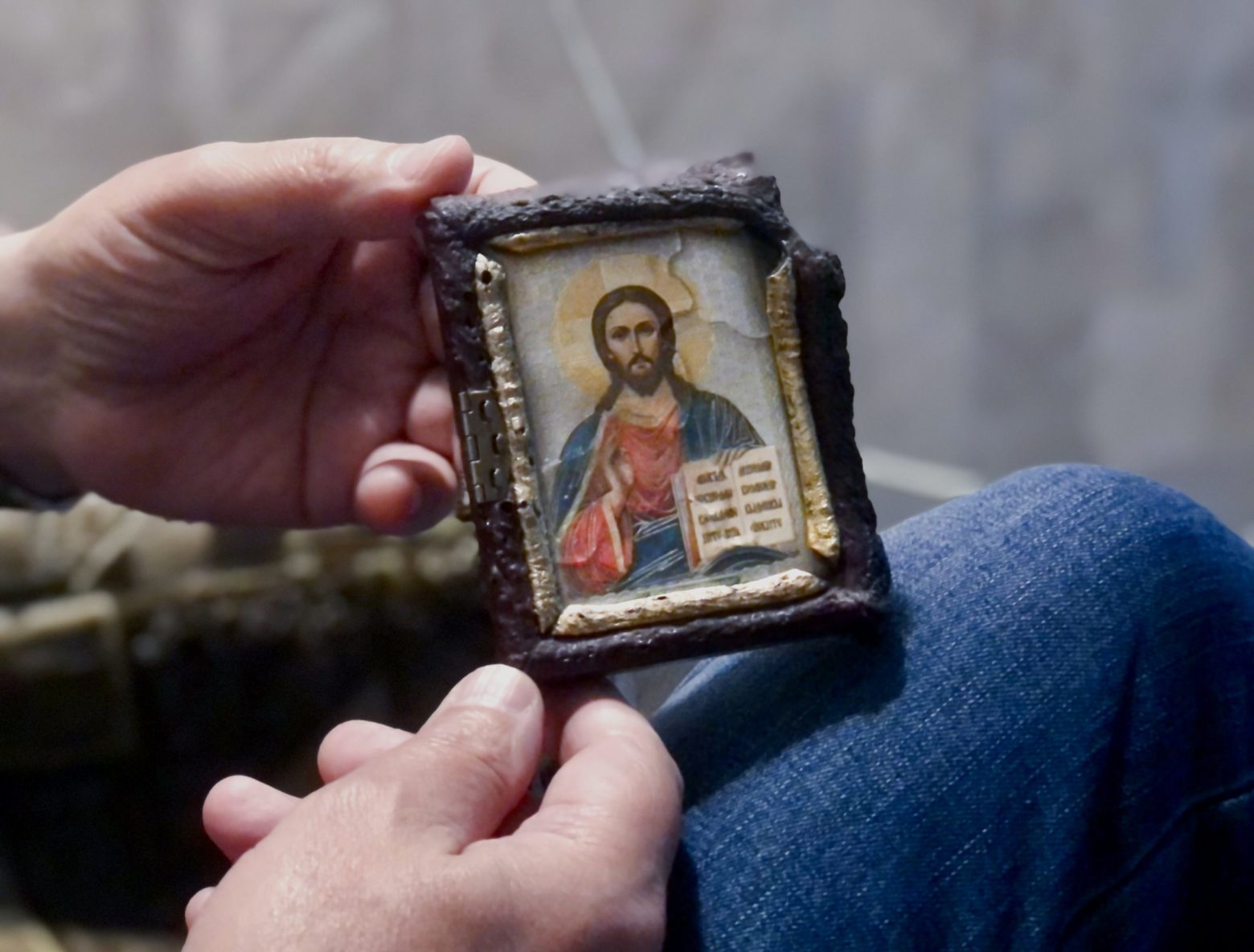 Icon the family took with them
Icon the family took with themCurrently, Yevhen and his wife are going through bureaucratic red tape as they try to renew their documents and get guardianship of their grandson. Yevhen talks unwillingly about his father, he and Anastasia got divorced:
“He is a person who is not well adapted to family life. It so happened that I am also Sashko’s godfather. I have been spending much time with him since he was born. Everyone around, and my sister, in particular, says that he looks a lot like me.”
Yevhen knows from Sashko’s “second grandmother” that his father, a soldier, has been in Russian captivity since the end of March.
Now the Kostomanovs are making efforts so that their grandson does not remember what they went through in Mariupol.
He is a very smart boy. He understands that it is difficult for us. And we protect each other,” Yevhen lowers his voice so that his grandson does not hear his words from the next room, “I try to be with him all the time so that he does not feel some kind of… emptiness.

